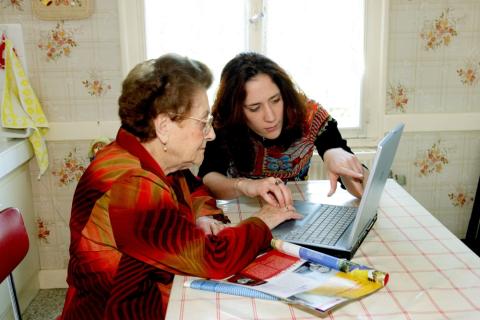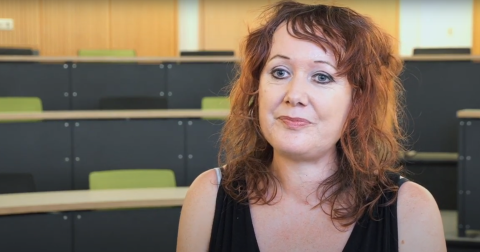Social technology crucial for older adults in times of corona
Elderly people, like everyone else, want to be seen and appreciated. They also have fundamental social needs, such as feeling connected, being independent and meaningful. Social technology can, certainly these days, play a large and valuable role in fulfilling those social needs, according to Tina ten Bruggencate in her dissertation (PhD Defence on July 2).
Corona crisis
In recent months, Tina's findings have been further confirmed during the corona crisis. Social needs of the elderly are essential. Older adults are forced to sit at home, while they prefer to stand in the midst of society and to be connected with others.

This indicates the importance of human contact, love, friendship and connectedness, but also the importance of a daily chat about the weather or politics; the daily contact through which you are seen, appreciated and (still) needed. Elderly people not only value their intimate network (family and friends) in fulfilling their social needs, but also peripheral network members (neighbours, acquaintances or the lady of the drugstore).
Older adults struggle with technology, installation, updates, wifi
Reciprocity
Elderly people want to be active in their own lives and participate in the lives of others, for example through volunteering. An important concept in this respect is reciprocity, which means that a relationship consists of give and take. Reciprocity strengthens the relationships older adults have.
Be meaningful and stay meaningful
Interventions in the field of social needs often focus on bringing elderly people into contact with others. Tina felt that interventions should also focus on being meaningful, such as volunteering. Elderly people would like to contribute, and don't want to be dependent and sit behind the curtains. This confirms what we have already learned from the so-called blue zones of the world, where people live longer through a healthy lifestyle combined with an active (social) role in their community. They use their talents and skills for the community.
Social technology enriches
Facebook, WhatsApp, video calls and e-mail still play a modest role in the lives of the elderly. A large proportion of the respondents did not actively use social technology. Those who do, strengthen and enrich their relationships by sharing photos and videos, for example. The use of social technology makes older adults and people from their network feel at ease. It feels safe to be reachable at all times with a smartphone. However, it also has disadvantages. Elderly people struggle with technology, with installation, with updates, with wifi. And social technology should not replace face-to-face contact. There is annoyance about (grand)children who are too busy with their mobile during their visit.
Older people don't want to sit behind curtains, but use their talents for the community
Recommendations
Due to the corona crisis, the only way for the elderly to communicate with family and friends is often through social technology. Face-to-face contact has been significantly reduced, and the benefits and possibilities of social technology are getting much more attention under the present circumstances. Also the forced 'practicing' by the elderly with social technology in corona times may provide more connection in the near future, in addition to face-to-face contact. Tina recommends to use the talents and skills of older people much more and help them with the use of social technology.
Tina ten Bruggencate (Sint Oedenrode, 1973) currently works as a lecturer and researcher at Fontys Hogeschool HRM and Psychology, and is affiliated with the Human and Technology research group. The Humanities and Technology research group conducts practical research into the mutual influence of people and technology.

Before starting her PhD research, Tina was a science practitioner at the 'Academische Werkplaats voor Ouderen' of Tranzo (Department of the Tilburg School of Social and Behavioral Sciences, Tilburg University). The Academic Collaborative Center Care for Older Adults contributes to people-oriented care for older adults, specifically looking at the perspective of the elderly. Tina's PhD research goes into the role of social technology in fulfilling social needs of the elderly.
Noot to the editors
Tina ten Bruggencate will defend her PhD thesis, entitled The need to be needed; an exploration of older people's social needs, social technology and interventions (possibly livestreamed) on July, 2nd 2020, supervised by professor Katrien Luijkx (Tranzo).
For further information, interview requests or a digital copy of the dissertation, please contact Tina: t.tenbruggencate@fontys.nl
